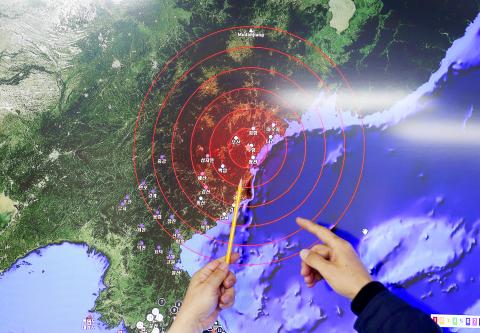North Korea yesterday said it successfully tested a miniaturized hydrogen nuclear device, claiming a significant advance in its strike capability and setting off alarm bells in Japan and South Korea.
The test, the fourth time the state has exploded a nuclear device, was ordered by young leader Kim Jong-un and successfully conducted at 10am, the official Korean Central News Agency said.
“Let the world look up to the strong, self-reliant nuclear-armed state,” Kim wrote in what North Korean state TV displayed as a handwritten note.

Photo: Reuters
The reported nuclear test drew condemnation abroad.
While a fourth nuclear test had been long expected, the claim that it was a hydrogen device, much more powerful than an atomic bomb, came as a surprise, as did the timing.
However, South Korean intelligence officials and several analysts questioned whether yesterday’s explosion was indeed a full-fledged test of a hydrogen device.
The device had a yield of about 6 kilotonnes, according to a South Korean lawmaker on the parliamentary intelligence committee — about the same size as the North’s last test, which was equivalent to 6 to 7 kilotonnes of TNT.
“Given the scale, it is hard to believe this is a real hydrogen bomb,” said Yang Uk, a senior research fellow at the Korea Defense and Security Forum and a policy adviser to the South Korean navy.
“They could have tested some middle stage kind [of device] between an A-bomb and H-bomb, but unless they come up with any clear evidence, it is difficult to trust their claim,” he said.
Joe Cirincione, a nuclear expert who is president of Ploughshares Fund, a global security organization, said North Korea might have mixed a hydrogen isotope in a normal atomic fission bomb.
“Because it is, in fact, hydrogen, they could claim it is a hydrogen bomb,” he said. “But it is not a true fusion bomb capable of the massive multi-megaton yields these bombs produce.”
The US Geological Survey reported a magnitude 5.1 earthquake that South Korea said was 49km from the Punggye-ri site where the North has conducted nuclear tests in the past.
The claim of miniaturizing, which would allow the device to be adapted as a weapon and placed on a missile, would also pose a new threat to the US, Japan and South Korea.
However, the North’s previous miniaturization claims have not been independently verified.
Japanese Prime Minister Shinzo Abe said Tokyo would make a firm response to North Korea’s challenge against nuclear non-proliferation.
South Korea said it would take all possible measures, including possible UN sanctions, to ensure Pyongyang paid the price after its fourth nuclear test.
“The government must now work closely with the international community to ensure that North Korea pays the commensurate price for the latest nuclear test,” South Korean President Park Geun-hye said in a statement.
“We must respond decisively through measures such as strong international sanctions,” she said.
The EU said that the test, if confirmed, would be a grave violation of international obligations.
NATO condemned the test, Kremlin spokesman Dmitry Peskov said Russia was “extremely worried” and China urged the North to honor its commitment to denuclearization.

CHAOS: Iranians took to the streets playing celebratory music after reports of Khamenei’s death on Saturday, while mourners also gathered in Tehran yesterday Iranian Supreme Leader Ayatollah Ali Khamenei was killed in a major attack on Iran launched by Israel and the US, throwing the future of the Islamic republic into doubt and raising the risk of regional instability. Iranian state television and the state-run IRNA news agency announced the 86-year-old’s death early yesterday. US President Donald Trump said it gave Iranians their “greatest chance” to “take back” their country. The announcements came after a joint US and Israeli aerial bombardment that targeted Iranian military and governmental sites. Trump said the “heavy and pinpoint bombing” would continue through the week or as long

TRUST: The KMT said it respected the US’ timing and considerations, and hoped it would continue to honor its commitments to helping Taiwan bolster its defenses and deterrence US President Donald Trump is delaying a multibillion-dollar arms sale to Taiwan to ensure his visit to Beijing is successful, a New York Times report said. The weapons sales package has stalled in the US Department of State, the report said, citing US officials it did not identify. The White House has told agencies not to push forward ahead of Trump’s meeting with Chinese President Xi Jinping (習近平), it said. The two last month held a phone call to discuss trade and geopolitical flashpoints ahead of the summit. Xi raised the Taiwan issue and urged the US to handle arms sales to

State-run CPC Corp, Taiwan (CPC, 台灣中油) yesterday said that it had confirmed on Saturday night with its liquefied natural gas (LNG) and crude oil suppliers that shipments are proceeding as scheduled and that domestic supplies remain unaffected. The CPC yesterday announced the gasoline and diesel prices will rise by NT$0.2 and NT$0.4 per liter, respectively, starting Monday, citing Middle East tensions and blizzards in the eastern United States. CPC also iterated it has been reducing the proportion of crude oil imports from the Middle East and diversifying its supply sources in the past few years in response to geopolitical risks, expanding

An Emirates flight from Dubai arrived at Taiwan Taoyuan International Airport yesterday afternoon, the first service of the airline since the US and Israel launched strikes against Iran on Saturday. Flight EK366 took off from the United Arab Emirates (UAE) at 3:51am yesterday and landed at 4:02pm before taxiing to the airport’s D6 gate at Terminal 2 at 4:08pm, data from the airport and FlightAware, a global flight tracking site, showed. Of the 501 passengers on the flight, 275 were Taiwanese, including 96 group tour travelers, the data showed. Tourism Administration Deputy Director-General Huang He-ting (黃荷婷) greeted Taiwanese passengers at the airport and